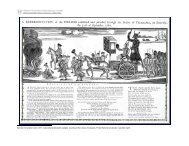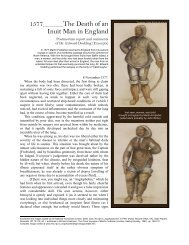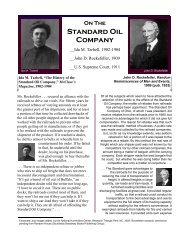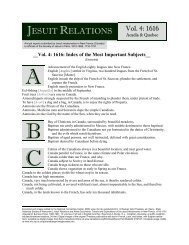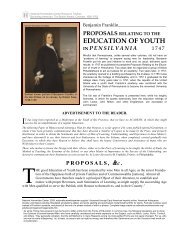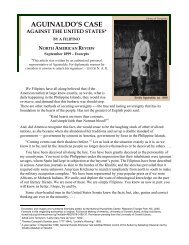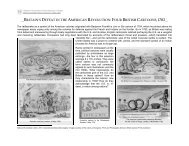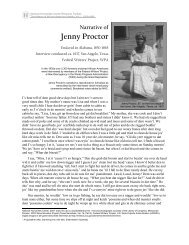Thomas Hutchinson, A Loyalist's Rebuttal to the Declaration of ...
Thomas Hutchinson, A Loyalist's Rebuttal to the Declaration of ...
Thomas Hutchinson, A Loyalist's Rebuttal to the Declaration of ...
You also want an ePaper? Increase the reach of your titles
YUMPU automatically turns print PDFs into web optimized ePapers that Google loves.
National Humanities Center Resource Toolbox<br />
Making <strong>the</strong> Revolution: America, 1763-1791<br />
“a list <strong>of</strong> imaginary grievances”<br />
A Loyalist’s <strong>Rebuttal</strong> <strong>to</strong> <strong>the</strong><br />
DECLARATION OF INDEPENDENCE<br />
<strong>Thomas</strong> <strong>Hutchinson</strong>, Strictures Upon <strong>the</strong> <strong>Declaration</strong> <strong>of</strong> <strong>the</strong> Congress at Philadelphia, London, 1776___EXCERPTS<br />
*<br />
A Bos<strong>to</strong>n-born Loyalist, <strong>Thomas</strong> <strong>Hutchinson</strong> held several appointments in <strong>the</strong> colony <strong>of</strong> Massachusetts, including chief justice,<br />
lieutenant governor, acting governor, and finally governor from 1771 <strong>to</strong> 1774, when he was replaced by a military governor (Gage)<br />
and <strong>to</strong>ok exile in Britain. Not entirely unsympa<strong>the</strong>tic <strong>to</strong> <strong>the</strong> colonists’ grievances, he had yet enforced all parliamentary actions,<br />
defended British authority over <strong>the</strong> colonies, and staunchly opposed rebellion and independence. Several months after <strong>the</strong> adoption<br />
<strong>of</strong> <strong>the</strong> <strong>Declaration</strong> <strong>of</strong> Independence in July 1776, <strong>Hutchinson</strong> published anonymously a 32-page rebuttal, dismissing <strong>the</strong> <strong>Declaration</strong><br />
as a “list <strong>of</strong> imaginary grievances.” Point by point, he dissects <strong>the</strong> “false and frivolous reasons” given by <strong>the</strong> delegates <strong>to</strong> justify <strong>the</strong>ir<br />
rejection <strong>of</strong> British rule. Strictures is addressed “<strong>to</strong> a Noble Lord”⎯Lord North, Prime Minister <strong>of</strong> Great Britain from 1770 <strong>to</strong> 1782.<br />
Overall, how does <strong>Hutchinson</strong> reject <strong>the</strong> legitimacy <strong>of</strong> <strong>the</strong> <strong>Declaration</strong>? How would <strong>Declaration</strong> signers have replied, especially John<br />
Adams, Samuel Adams, Benjamin Franklin, and its primary author, <strong>Thomas</strong> Jefferson?<br />
MY LORD,<br />
he last time I had <strong>the</strong> honor <strong>of</strong> being in your Lordship’s company, you observed that you were utterly<br />
T at a loss <strong>to</strong> what facts many parts <strong>of</strong> <strong>the</strong> <strong>Declaration</strong> <strong>of</strong> Independence published by <strong>the</strong> Philadelphia<br />
Congress referred, and that you wished <strong>the</strong>y had been more particularly mentioned that you might better<br />
judge <strong>of</strong> <strong>the</strong> grievances alleged as special causes <strong>of</strong> <strong>the</strong> separation <strong>of</strong> <strong>the</strong> Colonies from <strong>the</strong> o<strong>the</strong>r parts <strong>of</strong><br />
<strong>the</strong> Empire. This hint from your Lordship induced me <strong>to</strong> attempt a few Strictures upon <strong>the</strong> <strong>Declaration</strong>.<br />
Upon my first reading it, I thought <strong>the</strong>re would have been more policy in leaving <strong>the</strong> World al<strong>to</strong>ge<strong>the</strong>r<br />
ignorant <strong>of</strong> <strong>the</strong> motives <strong>of</strong> <strong>the</strong> Rebellion, than in <strong>of</strong>fering such false and frivolous reasons in support <strong>of</strong> it;<br />
and I flatter myself that, before I have finished this letter, your Lordship will be <strong>of</strong> <strong>the</strong> same mind. But I<br />
beg leave first <strong>to</strong> make a few remarks upon its rise and progress. . . .<br />
Their designs [plans] <strong>of</strong> Independence began soon after <strong>the</strong> reduction <strong>of</strong> Canada, 1 relying upon <strong>the</strong><br />
future cession <strong>of</strong> it by treaty. They could have no o<strong>the</strong>r pretense <strong>to</strong> a claim <strong>of</strong> independence, and <strong>the</strong>y<br />
made no o<strong>the</strong>r at first, than what <strong>the</strong>y called <strong>the</strong> natural rights <strong>of</strong> mankind <strong>to</strong> choose <strong>the</strong>ir own forms <strong>of</strong><br />
Government and change <strong>the</strong>m when <strong>the</strong>y please. This, <strong>the</strong>y were soon convinced, would not be sufficient<br />
<strong>to</strong> draw <strong>the</strong> people from <strong>the</strong>ir attachment <strong>to</strong> constitutions [colonial charters] under which <strong>the</strong>y had so long<br />
been easy and happy. Some grievances, real or imaginary, were <strong>the</strong>refore necessary. . . .<br />
It will cause greater prolixity [excess <strong>of</strong> words] <strong>to</strong> analyze <strong>the</strong> various parts <strong>of</strong> this <strong>Declaration</strong> than <strong>to</strong><br />
recite <strong>the</strong> whole. I will <strong>the</strong>refore present it <strong>to</strong> your Lordship’s view in distinct paragraphs, with my<br />
remarks in order as <strong>the</strong> paragraphs are published.<br />
DECLARATION OF INDEPENDENCE. In Congress, July 4, 1776 ⎯ A <strong>Declaration</strong> by <strong>the</strong> Representatives <strong>of</strong> <strong>the</strong> United<br />
States <strong>of</strong> America in General Congress assembled.<br />
When in <strong>the</strong> course <strong>of</strong> human events it becomes necessary for one People <strong>to</strong> dissolve <strong>the</strong> political bands<br />
which have connected <strong>the</strong>m with ano<strong>the</strong>r, and <strong>to</strong> assume among <strong>the</strong> Powers <strong>of</strong> <strong>the</strong> earth, <strong>the</strong> separate and equal<br />
station <strong>to</strong> which <strong>the</strong> laws <strong>of</strong> nature and <strong>of</strong> nature’s God entitle <strong>the</strong>m, a decent respect <strong>to</strong> <strong>the</strong> opinions <strong>of</strong><br />
mankind requires that <strong>the</strong>y should declare <strong>the</strong> causes which impel <strong>the</strong>m <strong>to</strong> <strong>the</strong> separation.<br />
* National Humanities Center, 2010: nationalhumanitiescenter.org/pds/. Text in Eighteenth Century Collections Online, Doc. T139308, courtesy <strong>of</strong> Gale/<br />
Cengage. Some formatting added (labels DECLARATION OF INDEPENDENCE and HUTCHINSON), and some spelling, punctuation, and grammar modernized<br />
by NHC for clarity. <strong>Declaration</strong> presented as printed in Strictures, save for some modernized spelling. Full text <strong>of</strong> Strictures available in <strong>the</strong> Online<br />
Library <strong>of</strong> Liberty at oll.libertyfund.org/index.php?option=com_content&task=view&id=1130&Itemid=264. Complete image credits at nationalhumanitiescenter.org/pds/makingrev/imagecredits.htm.<br />
1 Defeat <strong>of</strong> French Canada during <strong>the</strong> French and Indian War, formalized in <strong>the</strong> 1763 Treaty <strong>of</strong> Paris.
We hold <strong>the</strong>se truths <strong>to</strong> be self-evident ⎯ That all men are created equal, that <strong>the</strong>y are endowed by <strong>the</strong>ir<br />
Crea<strong>to</strong>r with certain unalienable Rights, that among <strong>the</strong>se are life, liberty and <strong>the</strong> pursuit <strong>of</strong> happiness, that <strong>to</strong><br />
secure <strong>the</strong>se rights, governments are instituted among men, deriving <strong>the</strong>ir just powers from <strong>the</strong> consent <strong>of</strong> <strong>the</strong><br />
governed; and whenever any form <strong>of</strong> government becomes destructive <strong>of</strong> <strong>the</strong>se ends, it is <strong>the</strong> right <strong>of</strong> <strong>the</strong> people<br />
<strong>to</strong> alter or abolish it, and <strong>to</strong> institute new government, laying its foundation on such principles and organizing<br />
its powers in such form as <strong>to</strong> <strong>the</strong>m shall seem most likely <strong>to</strong> effect <strong>the</strong>ir safety and happiness. Prudence indeed<br />
will dictate that governments long established, should not be changed for light and transient causes; and<br />
accordingly all experience hath shown that mankind are more disposed <strong>to</strong> suffer while evils are sufferable, than<br />
<strong>to</strong> right <strong>the</strong>mselves by abolishing <strong>the</strong> forms <strong>to</strong> which <strong>the</strong>y are accus<strong>to</strong>med. But when a long train <strong>of</strong> abuses and<br />
usurpations pursuing invariably <strong>the</strong> same object evinces a design <strong>to</strong> reduce <strong>the</strong>m under absolute despotism, it is<br />
<strong>the</strong>ir right, it is <strong>the</strong>ir duty <strong>to</strong> throw <strong>of</strong>f such government and <strong>to</strong> provide new guards for <strong>the</strong>ir future security.<br />
Such has been <strong>the</strong> patient sufferance <strong>of</strong> <strong>the</strong>se Colonies, and such is now <strong>the</strong> necessity which constrains <strong>the</strong>m <strong>to</strong><br />
alter <strong>the</strong>ir former systems <strong>of</strong> Government. The his<strong>to</strong>ry <strong>of</strong> <strong>the</strong> present King <strong>of</strong> Great Britain is a his<strong>to</strong>ry <strong>of</strong><br />
repeated injuries and usurpations, all having in direct object <strong>the</strong> establishment <strong>of</strong> an absolute tyranny over<br />
<strong>the</strong>se States. To prove this, let facts be submitted <strong>to</strong> a candid world. 2<br />
HUTCHINSON. They begin, my Lord, with a false hypo<strong>the</strong>sis, That <strong>the</strong> Colonies are one distinct people and<br />
<strong>the</strong> kingdom ano<strong>the</strong>r, connected by political bands. The Colonies, politically considered, never were a<br />
distinct people from <strong>the</strong> kingdom. There never has been but one political band, and that was just <strong>the</strong><br />
same before <strong>the</strong> first Colonists emigrated as it has been ever since, <strong>the</strong> Supreme Legislative Authority<br />
[Parliament], which hath essential right and is indispensably bound <strong>to</strong> keep all parts <strong>of</strong> <strong>the</strong> Empire<br />
entire until <strong>the</strong>re may be a separation consistent with <strong>the</strong> general good <strong>of</strong> <strong>the</strong> Empire, <strong>of</strong> which good,<br />
from <strong>the</strong> nature <strong>of</strong> government, this authority must be <strong>the</strong> sole judge. I should <strong>the</strong>refore be<br />
impertinent if I attempted <strong>to</strong> show in what case a whole people may be justified in rising up in<br />
oppugnation [opposition] <strong>to</strong> <strong>the</strong> powers <strong>of</strong> government, altering or abolishing <strong>the</strong>m and substituting,<br />
in whole or in part, new powers in <strong>the</strong>ir stead; or in what sense all men are created equal, or how far<br />
life, liberty, and <strong>the</strong> pursuit <strong>of</strong> happiness may be said <strong>to</strong> be unalienable. Only I could wish <strong>to</strong> ask 3 <strong>the</strong><br />
Delegates <strong>of</strong> Maryland, Virginia, and <strong>the</strong> Carolinas how <strong>the</strong>ir Constituents justify <strong>the</strong> depriving more<br />
than an hundred thousand Africans <strong>of</strong> <strong>the</strong>ir rights <strong>to</strong> liberty and <strong>the</strong> pursuit <strong>of</strong> happiness, and in some<br />
degree <strong>to</strong> <strong>the</strong>ir lives, if <strong>the</strong>se rights are so absolutely unalienable; nor shall I attempt <strong>to</strong> confute <strong>the</strong><br />
absurd notions <strong>of</strong> government or <strong>to</strong> expose <strong>the</strong> equivocal or inconclusive expressions contained in this<br />
<strong>Declaration</strong>; but ra<strong>the</strong>r <strong>to</strong> show <strong>the</strong> false representation made <strong>of</strong> <strong>the</strong> facts which are alleged <strong>to</strong> be <strong>the</strong><br />
evidence <strong>of</strong> injuries and usurpations, and <strong>the</strong> special motives <strong>to</strong> Rebellion. There are many <strong>of</strong> <strong>the</strong>m,<br />
with designs, left obscure; for as soon as <strong>the</strong>y are developed, instead <strong>of</strong> justifying, <strong>the</strong>y ra<strong>the</strong>r<br />
aggravate <strong>the</strong> criminality <strong>of</strong> this Revolt.<br />
DECLARATION OF INDEPENDENCE. He has refused his assent <strong>to</strong> laws <strong>the</strong> most wholesome and necessary for <strong>the</strong> public<br />
good.<br />
HUTCHINSON. . . . I remember no laws which any Colony has been restrained from passing, so as <strong>to</strong> cause<br />
any complaint <strong>of</strong> grievance, except those for issuing a fraudulent paper currency, and making it a<br />
legal tender; 4 but this is a restraint which for many years past has been laid on Assemblies by an act<br />
<strong>of</strong> Parliament, since which such laws cannot have been <strong>of</strong>fered <strong>to</strong> <strong>the</strong> King for his allowance<br />
[approval]. I <strong>the</strong>refore believe this <strong>to</strong> be a general charge [grievance], without any particulars <strong>to</strong><br />
support it; fit enough <strong>to</strong> be placed at <strong>the</strong> head <strong>of</strong> a list <strong>of</strong> imaginary grievances. . . .<br />
DECLARATION OF INDEPENDENCE. He has forbidden his Governors <strong>to</strong> pass laws <strong>of</strong> immediate and pressing importance,<br />
unless suspended in <strong>the</strong>ir operation till his assent should be obtained, and when so suspended, he has utterly<br />
neglected <strong>to</strong> attend <strong>the</strong>m.<br />
HUTCHINSON. . . . Some laws may have <strong>the</strong>ir full effect before <strong>the</strong> King’s pleasure can be known. Some<br />
may injuriously affect <strong>the</strong> property <strong>of</strong> <strong>the</strong> subject; and some may be prejudicial <strong>to</strong> <strong>the</strong> prerogative <strong>of</strong><br />
2<br />
For brief explanations <strong>of</strong> <strong>the</strong> grievances, see <strong>the</strong> annotated <strong>Declaration</strong> in this Resource Toolbox, in REBELLION #8: Declaring Independence.<br />
3<br />
I.e., if only I could ask <strong>the</strong> sou<strong>the</strong>rn slaveholders . . .<br />
4<br />
<strong>Hutchinson</strong> is referring <strong>to</strong> <strong>the</strong> parliamentary ban on colonies’ issuing <strong>the</strong>ir own paper money, long a sore point as colonists argued <strong>the</strong>y had <strong>to</strong>o little<br />
means <strong>to</strong> pay debts <strong>to</strong> British merchants.<br />
National Humanities Center � <strong>Thomas</strong> <strong>Hutchinson</strong>, Strictures upon <strong>the</strong> <strong>Declaration</strong> [<strong>of</strong> Independence], 1776, excerpts__ 2
<strong>the</strong> Crown, and <strong>to</strong> <strong>the</strong> trade, manufactures and shipping <strong>of</strong> <strong>the</strong> kingdom. Governors have been<br />
instructed, long before <strong>the</strong> present or <strong>the</strong> last reign, not <strong>to</strong> consent <strong>to</strong> such laws unless with a clause<br />
suspending <strong>the</strong>ir operations until <strong>the</strong> pleasure [decision] <strong>of</strong> <strong>the</strong> King shall be known. I am sure your<br />
Lordship will think that nothing is more reasonable. . . .<br />
I dare say, my Lord, that if <strong>the</strong>re has ever been an instance <strong>of</strong> any laws lying longer than necessary<br />
before <strong>the</strong> King’s pleasure has been signified, it has been owing <strong>to</strong> <strong>the</strong> inattention in some <strong>of</strong> <strong>the</strong><br />
servants <strong>of</strong> <strong>the</strong> Crown, and that upon proper application any grievance would have been immediately<br />
redressed.<br />
DECLARATION OF INDEPENDENCE. He has refused <strong>to</strong> pass o<strong>the</strong>r laws for <strong>the</strong> accommodation <strong>of</strong> large districts <strong>of</strong> People,<br />
unless those People would relinquish <strong>the</strong> right <strong>of</strong> representation in <strong>the</strong> legislature, a right inestimable <strong>to</strong> <strong>the</strong>m,<br />
and formidable <strong>to</strong> tyrants only.<br />
HUTCHINSON. We shall find, my Lord, that Massachusetts Bay is more concerned in this <strong>Declaration</strong> than<br />
any o<strong>the</strong>r Colony. This article respects [deals with] that Colony alone. . . No Governor ever refused <strong>to</strong><br />
consent <strong>to</strong> a law for making a new <strong>to</strong>wn . . . if provision was made that <strong>the</strong> inhabitants <strong>of</strong> <strong>the</strong> new<br />
<strong>to</strong>wn should continue <strong>to</strong> join with <strong>the</strong> old, or with any o<strong>the</strong>r <strong>to</strong>wn contiguous or near <strong>to</strong> it, in <strong>the</strong><br />
choice <strong>of</strong> Representatives; so that <strong>the</strong>re never was <strong>the</strong> least intention <strong>to</strong> deprive a single inhabitant <strong>of</strong><br />
<strong>the</strong> right <strong>of</strong> being represented . . . This is a willful misrepresentation made for <strong>the</strong> sake <strong>of</strong> <strong>the</strong> brutal<br />
insult at <strong>the</strong> close <strong>of</strong> <strong>the</strong> article.<br />
DECLARATION OF INDEPENDENCE. He has called <strong>to</strong>ge<strong>the</strong>r legislative bodies at places unusual, uncomfortable, and<br />
distant from <strong>the</strong> deposi<strong>to</strong>ry <strong>of</strong> <strong>the</strong>ir public records, for <strong>the</strong> sole purpose <strong>of</strong> fatiguing <strong>the</strong>m in<strong>to</strong> compliance with<br />
his measures.<br />
HUTCHINSON. To <strong>the</strong> same Colony this article also has respect. Your Lordship must remember <strong>the</strong> rio<strong>to</strong>us,<br />
violent opposition <strong>to</strong> Government in <strong>the</strong> Town <strong>of</strong> Bos<strong>to</strong>n, which alarmed <strong>the</strong> whole Kingdom in <strong>the</strong><br />
year 1768. 5 Four Regiments <strong>of</strong> <strong>the</strong> King’s forces were ordered <strong>to</strong> that Town <strong>to</strong> be aiding <strong>to</strong> <strong>the</strong> Civil<br />
Magistrate in res<strong>to</strong>ring and preserving peace and order. The House <strong>of</strong> Representatives, which was<br />
<strong>the</strong>n sitting in <strong>the</strong> Town, remonstrated <strong>to</strong> [petitioned] <strong>the</strong> Governor against posting Troops <strong>the</strong>re as<br />
being an invasion <strong>of</strong> <strong>the</strong>ir rights. He thought proper <strong>to</strong> adjourn <strong>the</strong>m <strong>to</strong> Cambridge, where <strong>the</strong> House<br />
had frequently sat at <strong>the</strong>ir own desire when <strong>the</strong>y had been alarmed with fear <strong>of</strong> smallpox in Bos<strong>to</strong>n;<br />
<strong>the</strong> place <strong>the</strong>refore was not unusual. The public rooms <strong>of</strong> <strong>the</strong> College [Harvard] were convenient for<br />
<strong>the</strong> Assembly <strong>to</strong> sit in, and <strong>the</strong> private houses <strong>of</strong> <strong>the</strong> Inhabitants for <strong>the</strong> Members <strong>to</strong> lodge in; it<br />
<strong>the</strong>refore was not uncomfortable. It was within four miles <strong>of</strong> <strong>the</strong> Town <strong>of</strong> Bos<strong>to</strong>n, and less distant<br />
than any o<strong>the</strong>r Town fit for <strong>the</strong> purpose. . . .<br />
. . . The [Massachusetts] House <strong>of</strong> Representatives raised <strong>the</strong> most frivolous objections against <strong>the</strong><br />
authority <strong>of</strong> <strong>the</strong> Governor <strong>to</strong> remove <strong>the</strong> Assembly from Bos<strong>to</strong>n, but proceeded never<strong>the</strong>less <strong>to</strong> <strong>the</strong><br />
business <strong>of</strong> <strong>the</strong> Session as <strong>the</strong>y used <strong>to</strong> do. In <strong>the</strong> next Session, without any new cause, <strong>the</strong> Assembly<br />
refused <strong>to</strong> do any business unless removed [moved back] <strong>to</strong> Bos<strong>to</strong>n. . . .<br />
They fatigued <strong>the</strong> Governor by adjourning from day <strong>to</strong> day, and refusing <strong>to</strong> do business one<br />
Session after ano<strong>the</strong>r, while he gave his constant attendance <strong>to</strong> no purpose; and this <strong>the</strong>y make <strong>the</strong><br />
King’s fatiguing <strong>the</strong>m <strong>to</strong> compel <strong>the</strong>m <strong>to</strong> comply with his measures.<br />
A brief narrative <strong>of</strong> this unimportant dispute between an American Governor and his Assembly<br />
needs an apology [explanation] <strong>to</strong> your Lordship. How ridiculous <strong>the</strong>n do those men make <strong>the</strong>mselves,<br />
who <strong>of</strong>fer it <strong>to</strong> <strong>the</strong> world as a ground <strong>to</strong> justify rebellion?<br />
“frivolous objections against <strong>the</strong> authority”<br />
5 Opposition <strong>to</strong> <strong>the</strong> Townshend Acts led <strong>to</strong> <strong>the</strong> first deployment <strong>of</strong> British troops for <strong>the</strong> purpose <strong>of</strong> enforcing British authority over <strong>the</strong> colonies.<br />
National Humanities Center � <strong>Thomas</strong> <strong>Hutchinson</strong>, Strictures upon <strong>the</strong> <strong>Declaration</strong> [<strong>of</strong> Independence], 1776, excerpts__ 3
DECLARATION OF INDEPENDENCE. He has dissolved Representative Houses repeatedly for opposing with manly<br />
firmness his Invasions on <strong>the</strong> rights <strong>of</strong> <strong>the</strong> People.<br />
HUTCHINSON. Contention between Governors and <strong>the</strong>ir Assemblies have caused dissolutions <strong>of</strong> such<br />
Assemblies, I suppose, in all <strong>the</strong> Colonies, in former as well as later times. I recollect but one instance<br />
<strong>of</strong> <strong>the</strong> dissolution <strong>of</strong> an Assembly by special order from <strong>the</strong> King, and that was in Massachusetts Bay.<br />
In 1768, <strong>the</strong> House <strong>of</strong> Representatives passed a vote or resolve in prosecution <strong>of</strong> <strong>the</strong> plan <strong>of</strong><br />
Independence, incompatible with <strong>the</strong> subordination <strong>of</strong> <strong>the</strong> Colonies <strong>to</strong> <strong>the</strong> supreme authority <strong>of</strong> <strong>the</strong><br />
Empire, and directed <strong>the</strong>ir Speaker <strong>to</strong> send a copy <strong>of</strong> it in circular letters <strong>to</strong> <strong>the</strong> Assemblies <strong>of</strong> <strong>the</strong><br />
o<strong>the</strong>r Colonies, 6 inviting <strong>the</strong>m <strong>to</strong> avow <strong>the</strong> principles <strong>of</strong> <strong>the</strong> resolve and <strong>to</strong> join in supporting <strong>the</strong>m.<br />
No Government can long subsist which admits <strong>of</strong> combinations <strong>of</strong> <strong>the</strong> subordinate powers against <strong>the</strong><br />
supreme. This proceeding was <strong>the</strong>refore, justly deemed highly unwarrantable, and indeed it was <strong>the</strong><br />
beginning <strong>of</strong> that unlawful confederacy which has gone on until it has caused at least temporary<br />
Revolt <strong>of</strong> all <strong>the</strong> Colonies which joined in it. . . .<br />
DECLARATION OF INDEPENDENCE. He has refused for a long time after such dissolutions <strong>to</strong> cause o<strong>the</strong>rs <strong>to</strong> be elected 7<br />
whereby <strong>the</strong> legislative powers, incapable <strong>of</strong> annihilation, have returned <strong>to</strong> <strong>the</strong> people at large for <strong>the</strong>ir<br />
exercise; <strong>the</strong> state remaining in <strong>the</strong> mean time exposed <strong>to</strong> all <strong>the</strong> dangers <strong>of</strong> invasion from without and<br />
convulsions within.<br />
HUTCHINSON. This . . . must relate <strong>to</strong> <strong>the</strong> same Colony only; for no o<strong>the</strong>r ever presumed, until <strong>the</strong> year 1774,<br />
when <strong>the</strong> general dissolution <strong>of</strong> <strong>the</strong> established government in all <strong>the</strong> Colonies was taking place, <strong>to</strong><br />
convene an Assembly without <strong>the</strong> Governor, by <strong>the</strong> mere act <strong>of</strong> <strong>the</strong> People. . . . The <strong>to</strong>wn [Bos<strong>to</strong>n],<br />
without delay, chose <strong>the</strong>ir former members . . . and <strong>the</strong>y sent circular letters <strong>to</strong> all <strong>the</strong> o<strong>the</strong>r <strong>to</strong>wns in<br />
<strong>the</strong> Province [colony] inviting <strong>the</strong>m <strong>to</strong> choose Committees also; and all <strong>the</strong>se Committees met in what<br />
<strong>the</strong>y called a Convention, and chose <strong>the</strong> Speaker <strong>of</strong> <strong>the</strong> last house <strong>the</strong>ir Chairman. Here was a House<br />
<strong>of</strong> Representatives in everything but name . . .<br />
This vacation <strong>of</strong> three months was <strong>the</strong> long time <strong>the</strong> people waited before <strong>the</strong>y exercised <strong>the</strong>ir<br />
unalienable powers; <strong>the</strong> Invasions from without were <strong>the</strong> arrival or expectation <strong>of</strong> three or four<br />
regiments sent by <strong>the</strong> King <strong>to</strong> aid <strong>the</strong> Civil Magistrate in preserving <strong>the</strong> peace; and <strong>the</strong> Convulsions<br />
within were <strong>the</strong> tumults, riots and acts <strong>of</strong> violence which this Convention was called, not <strong>to</strong> suppress<br />
but <strong>to</strong> encourage.<br />
DECLARATION OF INDEPENDENCE. He has endeavored <strong>to</strong> prevent <strong>the</strong> population <strong>of</strong> <strong>the</strong>se States; for that purpose<br />
obstructing <strong>the</strong> laws for naturalization <strong>of</strong> foreigners, refusing <strong>to</strong> pass o<strong>the</strong>rs <strong>to</strong> encourage <strong>the</strong>ir migrations<br />
hi<strong>the</strong>r, and raising <strong>the</strong> conditions <strong>of</strong> new appropriations <strong>of</strong> lands.<br />
HUTCHINSON. . . . I cannot conceive that <strong>the</strong> subjects in <strong>the</strong> Colonies would have had any cause <strong>of</strong> complaint<br />
if <strong>the</strong>re never had been any encouragement given <strong>to</strong> foreigners <strong>to</strong> settle among <strong>the</strong>m; and it was an act<br />
<strong>of</strong> mere favor <strong>to</strong> <strong>the</strong> Colonies which admitted foreigners <strong>to</strong> a claim <strong>of</strong> naturalization after a residence<br />
<strong>of</strong> seven years. How has <strong>the</strong> King obstructed <strong>the</strong> operation <strong>of</strong> this act? In no o<strong>the</strong>r way than by<br />
refusing his assent <strong>to</strong> colony acts for fur<strong>the</strong>r encouragement. Nothing can be more regular and<br />
constitutional. Shall any o<strong>the</strong>r than <strong>the</strong> supreme authority <strong>of</strong> <strong>the</strong> Empire judge upon what terms<br />
foreigners may be admitted <strong>to</strong> <strong>the</strong> privilege <strong>of</strong> natural born subjects? Parliament alone may pass acts<br />
for this purpose. . . .<br />
DECLARATION OF INDEPENDENCE. He has obstructed <strong>the</strong> administration <strong>of</strong> justice by refusing his assent <strong>to</strong> laws for<br />
establishing judiciary powers.<br />
HUTCHINSON. I was, My Lord, somewhat at a loss, upon first reading this article, <strong>to</strong> what transaction or <strong>to</strong><br />
what Colony it could refer. I soon found, that <strong>the</strong> Colony must be North Carolina, and that <strong>the</strong><br />
6 The Massachusetts Circular Letter <strong>of</strong> February 1768. The Massachusetts House <strong>of</strong> Representatives sent <strong>to</strong> all colonial assemblies a letter, written by<br />
Samuel Adams, promoting <strong>the</strong> unified opposition <strong>of</strong> <strong>the</strong> colonies <strong>to</strong> <strong>the</strong> Townshend Acts and asserting that only <strong>the</strong> colonial assemblies, not<br />
Parliament, had <strong>the</strong> authority <strong>to</strong> tax <strong>the</strong> colonists⎯an early statement <strong>of</strong> this <strong>the</strong>n radical concept. When <strong>the</strong> British ordered <strong>the</strong> retraction <strong>of</strong> <strong>the</strong> letter,<br />
<strong>the</strong> Massachusetts House refused⎯and was promptly dissolved by <strong>the</strong> governor, a fate shared by <strong>the</strong> Virginia assembly <strong>the</strong> following spring when it<br />
issued resolutions in support <strong>of</strong> <strong>the</strong> Massachusetts resolutions. See CRISIS #4 in this Resource Toolbox for selections from <strong>the</strong> Circular Letter.<br />
7 Incorrectly printed as “erected” in Strictures.<br />
National Humanities Center � <strong>Thomas</strong> <strong>Hutchinson</strong>, Strictures upon <strong>the</strong> <strong>Declaration</strong> [<strong>of</strong> Independence], 1776, excerpts__ 4
“How does this give a claim <strong>to</strong> America?”<br />
transaction referred <strong>to</strong> is a reproach upon <strong>the</strong> Colony which <strong>the</strong> [Continental] Congress have most<br />
wickedly perverted <strong>to</strong> cast reproach upon <strong>the</strong> King. . . . In North Carolina, <strong>the</strong> law for [deb<strong>to</strong>r]<br />
attachments 8 was tacked <strong>to</strong>, or was part <strong>of</strong>, <strong>the</strong> same law which established <strong>the</strong>ir Courts <strong>of</strong> Justice.<br />
The Governor, as he ought <strong>to</strong> have done if he had received no instruction, refused a bill for reviving<br />
<strong>the</strong> law, because <strong>the</strong> provision for attachments was part <strong>of</strong> it. The Assembly refused <strong>to</strong> pass <strong>the</strong> bill<br />
without <strong>the</strong> provision, and in this way determined <strong>the</strong>y would have no Courts <strong>of</strong> Justice, . . .<br />
DECLARATION OF INDEPENDENCE. He has made Judges dependent on his will alone for <strong>the</strong> tenure <strong>of</strong> <strong>the</strong>ir <strong>of</strong>fices, and<br />
<strong>the</strong> amount and payment <strong>of</strong> <strong>the</strong>ir salaries.<br />
HUTCHINSON. . . . The Judges in America, except <strong>the</strong> Charter Colonies, have always been dependent on <strong>the</strong><br />
Crown for <strong>the</strong>ir continuance in <strong>of</strong>fice; and in some Colonies, <strong>the</strong> salaries <strong>of</strong> <strong>the</strong> Chief Justice and<br />
sometimes <strong>the</strong> o<strong>the</strong>r Judges have been paid by <strong>the</strong> Crown, and <strong>the</strong> Colonies have considered it as an<br />
act <strong>of</strong> favor shown <strong>the</strong>m.<br />
There has been a change in <strong>the</strong> constitution <strong>of</strong> England in respect <strong>of</strong> <strong>the</strong> tenure <strong>of</strong> <strong>the</strong> <strong>of</strong>fice <strong>of</strong> <strong>the</strong><br />
Judges. How does this give a claim <strong>to</strong> America? It will be said <strong>the</strong> reason in both cases is <strong>the</strong> same.<br />
This will not be allowed, and until <strong>the</strong> King shall judge it so, <strong>the</strong>re can be no room for exception <strong>to</strong><br />
his retaining his prerogative. . . .<br />
DECLARATION OF INDEPENDENCE. He has erected a Multitude <strong>of</strong> new <strong>of</strong>fices, and sent hi<strong>the</strong>r swarms <strong>of</strong> Officers <strong>to</strong><br />
harass our people and eat out <strong>the</strong>ir substance.<br />
HUTCHINSON. I know <strong>of</strong> no new <strong>of</strong>fices erected in America in <strong>the</strong> present reign, except those <strong>of</strong> <strong>the</strong><br />
Commissioners <strong>of</strong> <strong>the</strong> Cus<strong>to</strong>ms and <strong>the</strong>ir dependents. 9 Five Commissioners were appointed, and four<br />
Surveyors General dismissed; perhaps fifteen <strong>to</strong> twenty clerks and under <strong>of</strong>ficers were necessary for<br />
this board more than <strong>the</strong> Surveyors had occasion for before . . . Thirty or forty additional <strong>of</strong>ficers in<br />
<strong>the</strong> whole Continent, are <strong>the</strong> Swarms which eat out <strong>the</strong> substance <strong>of</strong> <strong>the</strong> boasted number <strong>of</strong> three<br />
millions <strong>of</strong> people. . .<br />
[N]one but illicit traders ever had any reason <strong>to</strong> complain <strong>of</strong> grievances; and <strong>the</strong>y <strong>of</strong> no o<strong>the</strong>r than<br />
<strong>of</strong> being better watched than <strong>the</strong>y had ever been before. At this time <strong>the</strong> authority <strong>of</strong> Parliament <strong>to</strong><br />
pass Acts for regulating commerce was acknowledged, but every measure for carrying such Acts in<strong>to</strong><br />
execution was pronounced an injury, and usurpation, and all <strong>the</strong> effects prevented.<br />
DECLARATION OF INDEPENDENCE. He has kept among us in times <strong>of</strong> peace standing armies, without <strong>the</strong> consent <strong>of</strong> our<br />
legislatures.<br />
HUTCHINSON. This is <strong>to</strong>o nuga<strong>to</strong>ry [trivial/insubstantial] <strong>to</strong> deserve any remark. He has kept no armies<br />
among <strong>the</strong>m without <strong>the</strong> consent <strong>of</strong> <strong>the</strong> Supreme Legislature [Parliament]. It is begging <strong>the</strong> question<br />
<strong>to</strong> suppose that this authority was not sufficient without <strong>the</strong> aid <strong>of</strong> <strong>the</strong>ir own Legislatures.<br />
DECLARATION OF INDEPENDENCE. He has affected <strong>to</strong> render <strong>the</strong> Military independent <strong>of</strong> and superior <strong>to</strong> <strong>the</strong> Civil<br />
Power.<br />
HUTCHINSON. When <strong>the</strong> Subordinate Civil Powers <strong>of</strong> <strong>the</strong> Empire became Aiders <strong>of</strong> <strong>the</strong> people in acts <strong>of</strong><br />
Rebellion, <strong>the</strong> King, as well he might, has employed <strong>the</strong> Military Power <strong>to</strong> reduce those rebellious<br />
Civil Powers <strong>to</strong> <strong>the</strong>ir constitutional subjection <strong>to</strong> <strong>the</strong> Supreme Civil Power. In no o<strong>the</strong>r sense has he<br />
ever affected <strong>to</strong> render <strong>the</strong> Military independent <strong>of</strong>, and superior <strong>to</strong>, <strong>the</strong> Civil Power.<br />
8<br />
Because colonial bankruptcy laws had resulted in British traders receiving a small percentage <strong>of</strong> credi<strong>to</strong>rs’ assets when seized for payment <strong>of</strong> debts,<br />
<strong>the</strong> colonial assemblies had been blocked from passing new “attachment” (similar <strong>to</strong> garnishment) laws with like provisions.<br />
9<br />
The creation <strong>of</strong> new cus<strong>to</strong>ms <strong>of</strong>ficials in 1767 with authority <strong>to</strong> block colonial smuggling (used for decades <strong>to</strong> avoid British import taxes and long<br />
ignored by Britain) enflamed opposition in New England.<br />
National Humanities Center � <strong>Thomas</strong> <strong>Hutchinson</strong>, Strictures upon <strong>the</strong> <strong>Declaration</strong> [<strong>of</strong> Independence], 1776, excerpts__ 5
DECLARATION OF INDEPENDENCE. He has combined with o<strong>the</strong>rs <strong>to</strong> subject us <strong>to</strong> a jurisdiction foreign <strong>to</strong> our<br />
Constitution and unacknowledged by our Laws, giving his assent <strong>to</strong> <strong>the</strong>ir pretended Acts <strong>of</strong> Legislation. 10<br />
HUTCHINSON. This is a strange way <strong>of</strong> defining <strong>the</strong> part which <strong>the</strong> Kings <strong>of</strong> England take in conjunction with<br />
<strong>the</strong> Lords and Commons in passing Acts <strong>of</strong> Parliament. . . And is it not <strong>the</strong> grossest prevarication <strong>to</strong><br />
say this jurisdiction is unacknowledged by <strong>the</strong>ir laws, when all Acts <strong>of</strong> Parliament which respect [deal<br />
with] <strong>the</strong>m have at all times been <strong>the</strong>ir rule <strong>of</strong> law in all <strong>the</strong>ir judicial proceedings? . . .<br />
DECLARATION OF INDEPENDENCE. For quartering large bodies <strong>of</strong> armed troops among us.<br />
HUTCHINSON. When troops were employed in America in <strong>the</strong> last reign <strong>to</strong> protect <strong>the</strong> Colonies against <strong>the</strong><br />
French invasion [French and Indian War], it was necessary <strong>to</strong> provide against mutiny and desertion<br />
and <strong>to</strong> secure proper quarters [housing]. Temporary Acts <strong>of</strong> Parliament were passed for that purpose<br />
and submitted <strong>to</strong> in <strong>the</strong> Colonies. Upon <strong>the</strong> peace, raised ideas <strong>to</strong>ok place in <strong>the</strong> Colonies <strong>of</strong> <strong>the</strong>ir own<br />
importance and caused a reluctance against Parliamentary authority and an opposition <strong>to</strong> <strong>the</strong> Acts for<br />
quartering troops, not because <strong>the</strong> provision made was in itself unjust or unequal, but because <strong>the</strong>y<br />
were Acts <strong>of</strong> a Parliament whose authority was denied. The provision was as similar <strong>to</strong> that in<br />
England as <strong>the</strong> state <strong>of</strong> <strong>the</strong> Colonies would admit.<br />
DECLARATION OF INDEPENDENCE. For protecting <strong>the</strong>m by a mock trial from punishment for any murder which <strong>the</strong>y<br />
should commit on <strong>the</strong> Inhabitants <strong>of</strong> <strong>the</strong>se States.<br />
HUTCHINSON. . . . To try men before a biased and predetermined Jury would be a mock trial. To prevent<br />
this, <strong>the</strong> Act <strong>of</strong> Parliament [that <strong>the</strong> colonies] complained <strong>of</strong> was passed. 11 Surely, if in any case<br />
Parliament may interpose and alter <strong>the</strong> general rule <strong>of</strong> law, it may in this. America has not been<br />
distinguished from o<strong>the</strong>r parts <strong>of</strong> <strong>the</strong> Empire. Indeed, <strong>the</strong> removal <strong>of</strong> trials for <strong>the</strong> sake <strong>of</strong><br />
unprejudiced disinterested Juries is al<strong>to</strong>ge<strong>the</strong>r consistent with <strong>the</strong> spirit <strong>of</strong> our laws, and <strong>the</strong> practice<br />
<strong>of</strong> courts in changing <strong>the</strong> venue from one county <strong>to</strong> ano<strong>the</strong>r.<br />
DECLARATION OF INDEPENDENCE. For cutting <strong>of</strong>f our trade with all parts <strong>of</strong> <strong>the</strong> world.<br />
HUTCHINSON. Certainly, my Lord, this could not be a cause <strong>of</strong> Revolt. The Colonies had revolted from <strong>the</strong><br />
Supreme Authority <strong>to</strong> which by <strong>the</strong>ir constitutions <strong>the</strong>y were subject before <strong>the</strong> Act passed. A<br />
Congress had assumed an authority over <strong>the</strong> whole, and had rebelliously prohibited all commerce<br />
with <strong>the</strong> rest <strong>of</strong> <strong>the</strong> Empire. This act, <strong>the</strong>refore, will be considered by <strong>the</strong> candid world as a pro<strong>of</strong> <strong>of</strong><br />
<strong>the</strong> reluctance in government against what is dernier [last] resort in every state, and as a milder<br />
measure <strong>to</strong> bring <strong>the</strong> Colonies <strong>to</strong> a re-union with <strong>the</strong> rest <strong>of</strong> <strong>the</strong> Empire.<br />
DECLARATION OF INDEPENDENCE. For imposing taxes on us without our consent.<br />
HUTCHINSON. How <strong>of</strong>ten has your Lordship heard it said that <strong>the</strong> Americans are willing <strong>to</strong> submit <strong>to</strong> <strong>the</strong><br />
authority <strong>of</strong> Parliament in all cases except that <strong>of</strong> taxes? Here we have a declaration made <strong>to</strong> <strong>the</strong><br />
world <strong>of</strong> <strong>the</strong> causes which have impelled separation. . . That <strong>of</strong> taxes seems <strong>to</strong> have been in danger <strong>of</strong><br />
being forgot. It comes in late [in <strong>the</strong> <strong>Declaration</strong>] and in as slight a manner as is possible. And I know,<br />
my Lord, that <strong>the</strong>se men, in <strong>the</strong> early days <strong>of</strong> <strong>the</strong>ir opposition <strong>to</strong> Parliament, have acknowledged that<br />
<strong>the</strong>y pitched upon this subject <strong>of</strong> taxes because it was most alarming <strong>to</strong> <strong>the</strong> people, every man<br />
perceiving immediately that he is personally affected by it . . .<br />
DECLARATION OF INDEPENDENCE. For depriving us in many cases <strong>of</strong> <strong>the</strong> benefits <strong>of</strong> a trial by jury.<br />
HUTCHINSON. . . . I recollect no cases in which trials by Juries are taken away in America by Acts <strong>of</strong><br />
Parliament, except such as are tried by <strong>the</strong> Courts <strong>of</strong> Admiralty, 12 and <strong>the</strong>se are ei<strong>the</strong>r for breaches <strong>of</strong><br />
<strong>the</strong> Acts <strong>of</strong> trade or trespasses upon <strong>the</strong> King’s woods. I take no notice <strong>of</strong> <strong>the</strong> Stamp Act, because it<br />
10 –“pretended acts <strong>of</strong> legislation”: wording in rough draft.<br />
–“acts <strong>of</strong> pretended legislation”: wording in reported draft and engrossed copy.<br />
11 In 1774 Parliament permitted <strong>the</strong> trials <strong>of</strong> British soldiers accused <strong>of</strong> crimes against colonists <strong>to</strong> take place in Britain instead <strong>of</strong> America.<br />
12 In 1768 Parliament created new colonial courts in which smugglers would be prosecuted without a jury, <strong>the</strong> verdicts being decided solely by <strong>the</strong><br />
judge. The right <strong>to</strong> trial by a jury <strong>of</strong> one’s peers had long been valued by colonists as a basic right <strong>of</strong> Englishmen.<br />
National Humanities Center � <strong>Thomas</strong> <strong>Hutchinson</strong>, Strictures upon <strong>the</strong> <strong>Declaration</strong> [<strong>of</strong> Independence], 1776, excerpts__ 6
was repealed soon after it was designed <strong>to</strong> take place.<br />
I am sorry, my Lord, that I am obliged <strong>to</strong> say <strong>the</strong>re could not be impartial trials by Juries in ei<strong>the</strong>r<br />
<strong>of</strong> <strong>the</strong>se cases. . . .<br />
DECLARATION OF INDEPENDENCE. For transporting us beyond seas <strong>to</strong> be tried for pretended <strong>of</strong>fenses.<br />
HUTCHINSON. I know <strong>of</strong> no Act, but that <strong>of</strong> <strong>the</strong> 12 th <strong>of</strong> <strong>the</strong> present reign, <strong>to</strong> prevent <strong>the</strong> setting fire <strong>to</strong> his<br />
Majesty’s Ships, Docks, Arsenals, &c. <strong>to</strong> which this article can refer — But are <strong>the</strong>se pretended [real]<br />
<strong>of</strong>fenses?<br />
By an Act <strong>of</strong> Parliament made in <strong>the</strong> 35 th year <strong>of</strong> King Henry <strong>the</strong> Eighth, all treasons committed in<br />
any parts [throughout] <strong>the</strong> realm may be tried in any county <strong>of</strong> England. . .<br />
An opinion prevailed in America that this Act was occasioned by <strong>the</strong> burning <strong>of</strong> <strong>the</strong> King’s<br />
Schooner Gaspee by people in <strong>the</strong> Colony <strong>of</strong> Rhode Island; 13 but <strong>the</strong> Act had passed before that fact<br />
was committed, though it was not generally known in America until some months after. . . .<br />
DECLARATION OF INDEPENDENCE. For abolishing <strong>the</strong> free system <strong>of</strong> English laws in a neighboring province, establishing<br />
<strong>the</strong>rein an arbitrary Government and enlarging its boundaries, so as <strong>to</strong> render it at once an example and fit<br />
instrument for introducing it in<strong>to</strong> <strong>the</strong>ir Colonies. 14<br />
HUTCHINSON. It would be impertinent <strong>to</strong> make any remarks upon <strong>the</strong> general fitness <strong>of</strong> <strong>the</strong> Quebec Act 15 for<br />
<strong>the</strong> purposes for which it passed, seeing your Lordship has so lately fully considered and given your<br />
voice <strong>to</strong> it. But what, my Lord, have <strong>the</strong> American Colonies <strong>to</strong> do with it? . . .<br />
. . . What claim could any <strong>of</strong> <strong>the</strong> Colonies have <strong>to</strong> a terri<strong>to</strong>ry beyond <strong>the</strong>ir own limits? No o<strong>the</strong>r<br />
security against an improper settlement <strong>of</strong> this country could have been made equally judicious and<br />
unexceptionable. This exception is <strong>the</strong>refore utterly impertinent . . .<br />
DECLARATION OF INDEPENDENCE.<br />
For taking away our Charters, abolishing our most valuable laws, altering fundamentally <strong>the</strong> forms <strong>of</strong> our<br />
Governments.<br />
For suspending our own legislatures and declaring <strong>the</strong>mselves invested with power <strong>to</strong> legislate for us in all<br />
cases whatsoever.<br />
HUTCHINSON. These two articles are so much <strong>of</strong> <strong>the</strong> same nature that I consider <strong>the</strong>m <strong>to</strong>ge<strong>the</strong>r. There has<br />
been no Colony Charter altered except that <strong>of</strong> Massachusetts Bay, and that in no respect that I<br />
recollect except that <strong>the</strong> appointment and power <strong>of</strong> <strong>the</strong> Council are made <strong>to</strong> conform <strong>to</strong> that <strong>of</strong> <strong>the</strong><br />
Council <strong>of</strong> <strong>the</strong> o<strong>the</strong>r Royal Governments, and <strong>the</strong> laws which relate <strong>to</strong> grand and petit juries are made<br />
<strong>to</strong> conform <strong>to</strong> <strong>the</strong> general laws <strong>of</strong> <strong>the</strong> Realm.<br />
The only instance <strong>of</strong> <strong>the</strong> suspension <strong>of</strong> any legislative power is that <strong>of</strong> <strong>the</strong> Province <strong>of</strong> New York<br />
for refusing <strong>to</strong> comply with an Act <strong>of</strong> Parliament for quartering <strong>the</strong> King’s troops posted <strong>the</strong>re for its<br />
protection and defense against <strong>the</strong> French and Indian enemies. . . .<br />
The common people who, relying upon <strong>the</strong> authority <strong>of</strong> o<strong>the</strong>rs, confound cases <strong>to</strong>ge<strong>the</strong>r which are<br />
so essentially different, may be excused; but what excuse, my Lord, can be made for those men, in<br />
England as well as in America, who, by such fallacies, have misguided <strong>the</strong> people and provoked <strong>the</strong>m<br />
<strong>to</strong> rebellion?<br />
DECLARATION OF INDEPENDENCE.<br />
He has abdicated Government here by declaring us out <strong>of</strong> his protection and waging War against us.<br />
He has plundered our Seas, ravaged our Coasts, burnt our Towns, and destroyed <strong>the</strong> Lives <strong>of</strong> our People.<br />
13<br />
After colonists attacked and ransacked <strong>the</strong> British ship Gaspee in 1772 while it was patrolling for smugglers, Parliament threatened <strong>to</strong> have <strong>the</strong><br />
accused sent <strong>to</strong> Britain for trial.<br />
14<br />
Wording in <strong>the</strong> final <strong>Declaration</strong>: “fit instrument for introducing <strong>the</strong> same absolute rule in<strong>to</strong> <strong>the</strong>se Colonies.”<br />
15<br />
In 1774 <strong>the</strong> First Continental Congress argued that <strong>the</strong> Coercive Acts and especially <strong>the</strong> Quebec Act comprised a ”ministerial plan” <strong>to</strong> reduce<br />
Americans <strong>to</strong> <strong>the</strong> “same state <strong>of</strong> slavery” as <strong>the</strong> French Catholic settlers in Canada. Through <strong>the</strong> Quebec Act, Parliament allowed French law and<br />
<strong>of</strong>ficial religion (Roman Catholicism) <strong>to</strong> continue in <strong>the</strong> conquered province (which Britain had won in <strong>the</strong> French and Indian War). In addition, <strong>the</strong><br />
boundaries <strong>of</strong> Quebec were expanded <strong>to</strong> <strong>the</strong> west and south in<strong>to</strong> <strong>the</strong> Ohio River Valley, incorporating land that Americans began <strong>to</strong> settle after 1763<br />
but, after 1774 because <strong>of</strong> <strong>the</strong> Quebec Act, without <strong>the</strong> guarantee <strong>of</strong> <strong>the</strong>ir longheld rights and privileges as Englishmen.<br />
National Humanities Center � <strong>Thomas</strong> <strong>Hutchinson</strong>, Strictures upon <strong>the</strong> <strong>Declaration</strong> [<strong>of</strong> Independence], 1776, excerpts__ 7
He is at this time, transporting large Armies <strong>of</strong> foreign mercenaries <strong>to</strong> complete <strong>the</strong> works <strong>of</strong> death, desolation<br />
and tyranny, already begun with circumstances <strong>of</strong> cruelty and perfidy scarcely paralleled in <strong>the</strong> most<br />
barbarous ages, and <strong>to</strong>tally unworthy <strong>the</strong> head <strong>of</strong> a civilized Nation.<br />
He has constrained our fellow Citizens, taken captive on <strong>the</strong> high Seas <strong>to</strong> bear arms against <strong>the</strong>ir Country, <strong>to</strong><br />
become <strong>the</strong> executioners <strong>of</strong> <strong>the</strong>ir Friends and Brethren, or <strong>to</strong> fall <strong>the</strong>mselves by <strong>the</strong>ir hands.<br />
He has excited domestic insurrections amongst us and has endeavored <strong>to</strong> bring on <strong>the</strong> Inhabitants <strong>of</strong> our<br />
frontiers, <strong>the</strong> merciless Indian Savages, whose known rule <strong>of</strong> warfare is an undistinguished destruction <strong>of</strong><br />
all ages, sexes and conditions.<br />
HUTCHINSON. These, my Lord, would be weighty charges from a loyal and dutiful people against an<br />
unprovoked Sovereign. They are more than <strong>the</strong> people <strong>of</strong> England pretended <strong>to</strong> bring against King<br />
James <strong>the</strong> Second in order <strong>to</strong> justify <strong>the</strong> Revolution. 16 Never was <strong>the</strong>re an instance <strong>of</strong> more<br />
consummate effrontery. The Acts <strong>of</strong> a justly incensed Sovereign for suppressing a most unnatural,<br />
unprovoked Rebellion are here assigned as <strong>the</strong> causes <strong>of</strong> this Rebellion. It is immaterial whe<strong>the</strong>r <strong>the</strong>y<br />
are true or false. They are all short <strong>of</strong> <strong>the</strong> penalty <strong>of</strong> <strong>the</strong> laws which had been violated. Before <strong>the</strong> date<br />
<strong>of</strong> any one <strong>of</strong> <strong>the</strong>m, <strong>the</strong> Colonists had as effectually renounced <strong>the</strong>ir allegiance by <strong>the</strong>ir deeds as <strong>the</strong>y<br />
have since done by <strong>the</strong>ir words. They had displaced <strong>the</strong> civil and military <strong>of</strong>ficers appointed by <strong>the</strong><br />
King’s authority and set up o<strong>the</strong>rs in <strong>the</strong>ir stead. They had new modeled <strong>the</strong>ir civil governments and<br />
appointed a general government, independent <strong>of</strong> <strong>the</strong> King, over <strong>the</strong> whole. They had taken up arms,<br />
and made a public declaration <strong>of</strong> <strong>the</strong>ir resolution <strong>to</strong> defend <strong>the</strong>mselves against <strong>the</strong> forces employed <strong>to</strong><br />
support his legal authority over <strong>the</strong>m. . . .<br />
DECLARATION OF INDEPENDENCE. In every stage <strong>of</strong> <strong>the</strong>se oppressions, we have petitioned for redress in <strong>the</strong> most<br />
humble terms; our repeated petitions have been answered only by repeated injury.<br />
HUTCHINSON. What <strong>the</strong>se oppressions were your Lordship has seen, for we may fairly conclude that everything<br />
appears in this <strong>Declaration</strong> which can give color <strong>to</strong> this horrid Rebellion, so that <strong>the</strong>se men can<br />
never complain <strong>of</strong> being condemned without a full hearing.<br />
But does your Lordship recollect any petitions in <strong>the</strong> several stages <strong>of</strong> <strong>the</strong>se pretended oppressions?<br />
Has <strong>the</strong>re ever been a petition <strong>to</strong> <strong>the</strong> King<br />
—— To give his Assent <strong>to</strong> <strong>the</strong>se wholesome and necessary Laws <strong>to</strong> which he had refused it?<br />
—— To allow his Governors <strong>to</strong> pass laws without a suspending clause, or without <strong>the</strong> people’s relinquishing<br />
<strong>the</strong> right <strong>of</strong> Representation?<br />
—— To withdraw his instructions for calling legislative bodies at unusual, uncomfortable and distant<br />
places?<br />
—— To allow Assemblies, which had been dissolved by his order, <strong>to</strong> meet again?<br />
—— To pass laws <strong>to</strong> encourage <strong>the</strong> migration <strong>of</strong> foreigners?<br />
—— To consent <strong>to</strong> <strong>the</strong> establishment <strong>of</strong> judiciary Powers?<br />
—— To suffer [permit] Judges <strong>to</strong> be independent for <strong>the</strong> continuance <strong>of</strong> <strong>the</strong>ir <strong>of</strong>fices and salaries?<br />
—— To vacate or disannul new erected <strong>of</strong>fices?<br />
—— To withdraw his troops in times <strong>of</strong> peace, until it appeared that <strong>the</strong> reason for it was <strong>to</strong> give a<br />
free course <strong>to</strong> Rebellion?<br />
And yet <strong>the</strong>se, my Lord, are all <strong>the</strong> oppressions pretended <strong>to</strong> have been received from <strong>the</strong> King,<br />
except those in combination with <strong>the</strong> two Houses <strong>of</strong> Parliament; and <strong>the</strong>y are all ei<strong>the</strong>r grossly<br />
misrepresented or so trivial and insignificant as <strong>to</strong> have been <strong>of</strong> no general no<strong>to</strong>riety in <strong>the</strong> time <strong>of</strong><br />
<strong>the</strong>m, or mere contests between Governors and Assemblies so light and transient as <strong>to</strong> have been<br />
presently forgot. All <strong>the</strong> petitions we have heard <strong>of</strong> have been against Acts <strong>of</strong> <strong>the</strong> Supreme<br />
Legislature; and in all <strong>of</strong> <strong>the</strong>m something has been inserted or something has been done previous <strong>to</strong><br />
<strong>the</strong>m with design <strong>to</strong> prevent <strong>the</strong>ir being received. . . .<br />
16 The Glorious Revolution <strong>of</strong> 1688-89, in which <strong>the</strong> au<strong>to</strong>cratic James II was deposed.<br />
National Humanities Center � <strong>Thomas</strong> <strong>Hutchinson</strong>, Strictures upon <strong>the</strong> <strong>Declaration</strong> [<strong>of</strong> Independence], 1776, excerpts__ 8
DECLARATION OF INDEPENDENCE. A Prince whose character is thus marked by every act which defines <strong>the</strong> tyrant is<br />
unfit <strong>to</strong> be <strong>the</strong> ruler <strong>of</strong> a free people.<br />
HUTCHINSON. Indignant resentment must seize <strong>the</strong> breast <strong>of</strong> every loyal subject. A tyrant, in modern<br />
language, means not merely an absolute and arbitrary but a cruel, merciless Sovereign. Have <strong>the</strong>se<br />
men given an instance <strong>of</strong> any one Act in which <strong>the</strong> King has exceeded <strong>the</strong> just Powers <strong>of</strong> <strong>the</strong> Crown<br />
as limited by <strong>the</strong> English Constitution? Has he ever departed from known established laws and<br />
substituted his own will as <strong>the</strong> rule <strong>of</strong> his actions? Has <strong>the</strong>re ever been a Prince by whom subjects in<br />
rebellion have been treated with less severity or with longer forbearance?<br />
DECLARATION OF INDEPENDENCE. Nor have we been wanting in attention <strong>to</strong> our British Brethren. We have warned<br />
<strong>the</strong>m from time <strong>to</strong> time <strong>of</strong> attempts by <strong>the</strong>ir legislature <strong>to</strong> extend an unwarrantable jurisdiction over us. We have<br />
reminded <strong>the</strong>m <strong>of</strong> <strong>the</strong> circumstances <strong>of</strong> our emigration and settlement here. We have appealed <strong>to</strong> <strong>the</strong>ir native<br />
justice and magnanimity, and we have conjured <strong>the</strong>m by <strong>the</strong> ties <strong>of</strong> our common kindred <strong>to</strong> disavow <strong>the</strong>se<br />
usurpations which would inevitably interrupt our connections and correspondence. They <strong>to</strong>o have been deaf <strong>to</strong><br />
<strong>the</strong> voice <strong>of</strong> justice and <strong>of</strong> consanguinity. We must <strong>the</strong>refore acquiesce in <strong>the</strong> necessity which denounces our<br />
Separation and hold <strong>the</strong>m, as we hold <strong>the</strong> rest <strong>of</strong> mankind, Enemies in War, in Peace Friends.<br />
We, <strong>the</strong>refore, <strong>the</strong> Representatives <strong>of</strong> <strong>the</strong> United States <strong>of</strong> America, in General Congress assembled,<br />
appealing <strong>to</strong> <strong>the</strong> Supreme Judge <strong>of</strong> <strong>the</strong> World for <strong>the</strong> rectitude <strong>of</strong> our intentions, do in <strong>the</strong> name and by authority<br />
<strong>of</strong> <strong>the</strong> good People <strong>of</strong> <strong>the</strong>se Colonies, solemnly publish and declare, That <strong>the</strong>se United Colonies are, and ought<br />
<strong>to</strong> be, 17 Free and Independent States, and that <strong>the</strong>y are absolved from all allegiance <strong>to</strong> <strong>the</strong> British Crown, and<br />
that all political connection between <strong>the</strong>m and <strong>the</strong> State <strong>of</strong> Great Britain is and ought <strong>to</strong> be <strong>to</strong>tally dissolved,<br />
and that as free and Independent States <strong>the</strong>y have full Power <strong>to</strong> levy War, conclude Peace, contract Alliances,<br />
establish Commerce, and <strong>to</strong> do all o<strong>the</strong>r Acts and things which Independent States may <strong>of</strong> right do. And for <strong>the</strong><br />
support <strong>of</strong> this <strong>Declaration</strong>, with a firm reliance on <strong>the</strong> protection <strong>of</strong> Divine Providence, we mutually pledge <strong>to</strong><br />
each o<strong>the</strong>r our Lives, our Fortunes and our sacred Honor. Signed by order and in behalf <strong>of</strong> <strong>the</strong> Congress.<br />
JOHN HANCOCK, President.<br />
HUTCHINSON. They have, my Lord, in <strong>the</strong>ir late address <strong>to</strong> <strong>the</strong> people <strong>of</strong> Great Britain, fully avowed <strong>the</strong>se<br />
principles <strong>of</strong> Independence by declaring <strong>the</strong>y will pay no obedience <strong>to</strong> <strong>the</strong> laws <strong>of</strong> <strong>the</strong> Supreme<br />
Legislature. They have also pretended that <strong>the</strong>se laws were <strong>the</strong> mandates <strong>of</strong> edicts <strong>of</strong> <strong>the</strong> Ministers, 18<br />
not <strong>the</strong> acts <strong>of</strong> a constitutional legislative power, and have endeavored <strong>to</strong> persuade such as <strong>the</strong>y called<br />
<strong>the</strong>ir British Brethren <strong>to</strong> justify <strong>the</strong> Rebellion begun in America, and from <strong>the</strong>nce <strong>the</strong>y expected a<br />
general convulsion in <strong>the</strong> Kingdom, and that measures <strong>to</strong> compel a submission would in this way be<br />
obstructed. These expectations failing, after <strong>the</strong>y had gone <strong>to</strong>o far in acts <strong>of</strong> Rebellion <strong>to</strong> hope for<br />
impunity, <strong>the</strong>y were under necessity <strong>of</strong> a separation, and <strong>of</strong> involving <strong>the</strong>mselves, and all over whom<br />
<strong>the</strong>y had usurped authority, in <strong>the</strong> distresses and horrors <strong>of</strong> war against that power from which <strong>the</strong>y<br />
revolted, and against all who continued in <strong>the</strong>ir subjection and fidelity <strong>to</strong> it. . . .<br />
Suffer me [permit me], my Lord, before I close this Letter, <strong>to</strong> observe that, though <strong>the</strong> pr<strong>of</strong>essed<br />
reason for publishing <strong>the</strong> <strong>Declaration</strong> was a decent respect <strong>to</strong> <strong>the</strong> opinions <strong>of</strong> mankind, yet <strong>the</strong> real<br />
design was <strong>to</strong> reconcile <strong>the</strong> people <strong>of</strong> America <strong>to</strong> that Independence which always before <strong>the</strong>y had<br />
been made <strong>to</strong> believe was not intended. 19 This design has <strong>to</strong>o well succeeded. The people have not<br />
observed <strong>the</strong> fallacy in reasoning from <strong>the</strong> whole <strong>to</strong> part, nor <strong>the</strong> absurdity <strong>of</strong> making <strong>the</strong> governed <strong>to</strong><br />
be governors. From a disposition <strong>to</strong> receive willingly complaints against Rulers, facts misrepresented<br />
have passed without examining. Discerning men have concealed <strong>the</strong>ir sentiments, because under <strong>the</strong><br />
present free government in America, no man may, by writing or speaking, contradict any part <strong>of</strong> this<br />
<strong>Declaration</strong> without being deemed an enemy <strong>to</strong> his country, and exposed <strong>to</strong> <strong>the</strong> rage and fury <strong>of</strong> <strong>the</strong><br />
populace.<br />
I have <strong>the</strong> honor <strong>to</strong> be, My LORD, Your Lordship’s must humble and most obedient servant.<br />
17 Wording in reported draft: “are and <strong>of</strong> right ought <strong>to</strong> be.”<br />
18 Ministers, i.e., <strong>of</strong>ficials in <strong>the</strong> Prime Minister’s cabinet (similar <strong>to</strong> <strong>the</strong> U.S. President’s cabinet); not referring <strong>to</strong> clergymen. Revolutionary leaders<br />
accused cabinet members <strong>of</strong> instigating parliamentary actions that violated colonists’ rights as Englishmen.<br />
19 Americans’ allegiance <strong>to</strong> Britain and <strong>the</strong> king was reaffirmed in most colonial declarations <strong>of</strong> rights and grievances, and petitions <strong>to</strong> <strong>the</strong> king for<br />
redress, even in<strong>to</strong> 1776. To an extent <strong>the</strong> statements were pro forma, and <strong>to</strong> an extent <strong>the</strong>y signalled <strong>the</strong> colonists’ rejection <strong>of</strong> parliamentary<br />
authority while maintaining allegiance <strong>to</strong> <strong>the</strong> king. Yet by <strong>the</strong> mid 1770s this middle ground had vanished from many leaders’ rhe<strong>to</strong>ric.<br />
National Humanities Center � <strong>Thomas</strong> <strong>Hutchinson</strong>, Strictures upon <strong>the</strong> <strong>Declaration</strong> [<strong>of</strong> Independence], 1776, excerpts__ 9


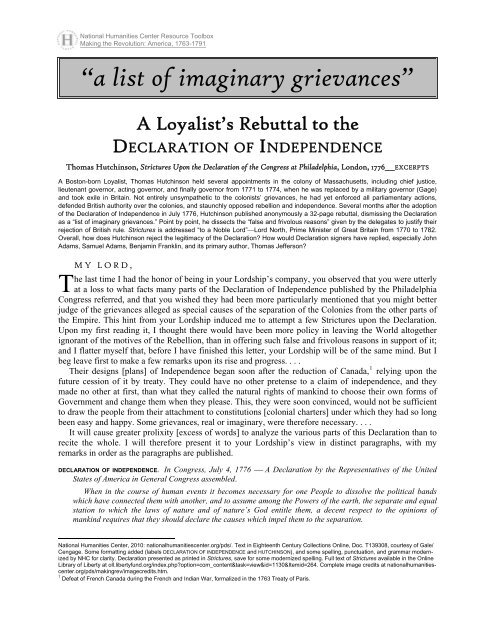
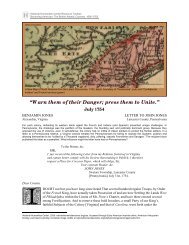
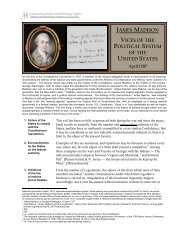
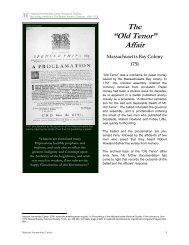
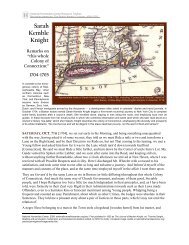
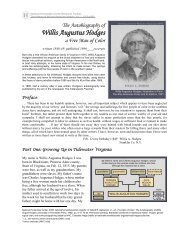
![The Requerimiento [Requirement], Council of Castile, 1510 ...](https://img.yumpu.com/21979685/1/190x245/the-requerimiento-requirement-council-of-castile-1510-.jpg?quality=85)
